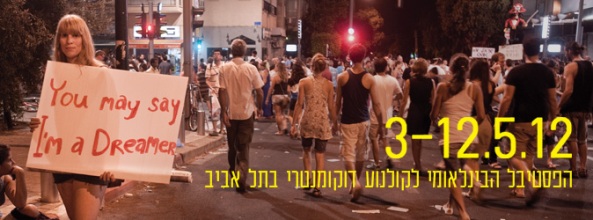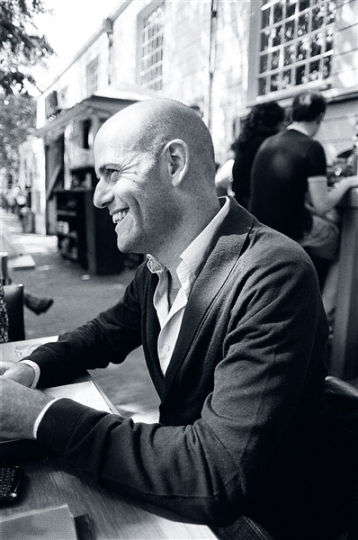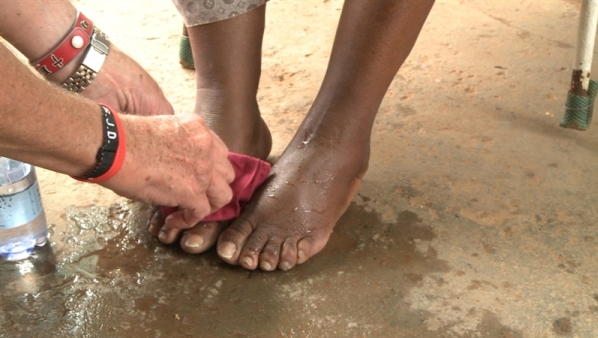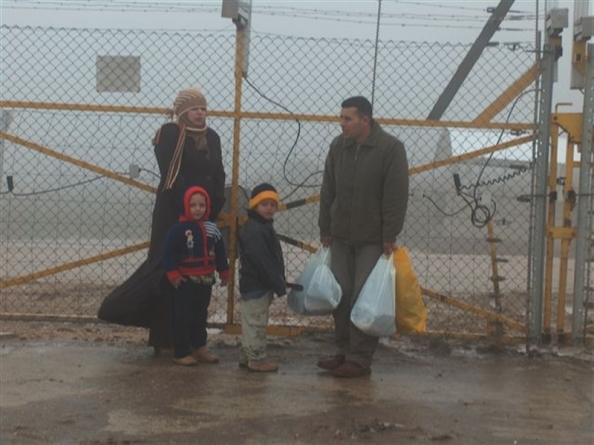 Docaviv International Documentary Film Festival will take place this year from May 3 – May 12, 2012, with Israeli and international films screened at the Tel Aviv Cinematheque, Tel Aviv Museum of Art, ZOA House and the Port of Tel Aviv. Now in its 14th edition, Docaviv focuses on the art of documentary cinema, revealing the myriad stories, people and events that compose our world, and the many different ways we observe and respond to this reality.
Docaviv International Documentary Film Festival will take place this year from May 3 – May 12, 2012, with Israeli and international films screened at the Tel Aviv Cinematheque, Tel Aviv Museum of Art, ZOA House and the Port of Tel Aviv. Now in its 14th edition, Docaviv focuses on the art of documentary cinema, revealing the myriad stories, people and events that compose our world, and the many different ways we observe and respond to this reality.
12 Israeli films in competition will premiere at the festival, selected from among 70 applicants. Members of the committee this year: Sinai Abt, Docaviv Artistic Director; Gabi Bibliovich, director (“Sof Onat Hatapuzim,” “Medinat Hayehudim,” “Tel Aviv”); and Neta Dvorkis, editor (“The Law in These Parts,” “Lone Samaritan”).
Israeli Films in Competition:
The Buddhist and the Cripple
Director: Noam Pinchas
Producer: Ronen Ben Tal
Synopsis: After a separation of more than a decade, Noam, the conscience-ridden director of the film, returns to the kibbutz where he grew up to save Zach, his childhood friend who has become a reclusive handicapped refusing rehabilitation. Noam devises a consistent and exhausting training routine with the aim of helping Zach run again, or at least move more easily. A touching and humorous friendship between two men who try to change their lives and fight their relentless emotionally charged past.
Home Movie
Director/Producer: Reuven Brodsky
Synopsis: The final chapter in the breakdown of the director’s family – one of many who did not survive the trials of immigration. The last thing that prevents the family’s collapse is a ground-level apartment in Jerusalem, where they managed to strike some roots. When the father, the last resident, leaves as well, they are faced with a dilemma: should they rent it or hold on to it as a final encore of stability? The decision is postponed until renovations are completed.

The Invisible Men
Director: Yariv Mozer
Producers: Yariv Mozer, Sander Werdnek, Gratian Langland, Adam Rozner, Hila Aviram
Synopsis: The untold story of persecuted gay Palestinians who hide illegally in Tel Aviv after fleeing the territories. The film’s heroes: Louie, 32 years old, a gay Palestinian who has been hiding in Tel Aviv for the past 8 years; Abdu, 24 years old, was exposed as gay in Ramallah and then accused of espionage and tortured by Palestinian security forces; Faris, 23 years old, escaped from his family that tried to kill him. Their only chance for survival is to seek asylum outside Israel and Palestine and leave their homeland forever behind.

One Day After Peace
Directors: Miri Laufer, Erez Laufer
Producers: Erez Laufer, Steven Markovitz
Synopsis: Can the means used to resolve the conflict in South Africa be applied to the Israeli-Palestinian conflict? Robi Damelin, who experienced both conflicts firsthand, wonders. She was born in South Africa during the apartheid era; later on she lost her son during his service with the Israeli army reserve in the Occupied Territories. She embarked on a journey back to South Africa to learn more about the country’s Truth and Reconciliation Commission established to overcome years of enmity. Damelin’s thought-provoking journey is driven by deep personal pain and a strong belief that a better future is possible.
Dangerous Children
Director/Producer: Amit Goren
Synopsis: Dangerous Children are those who suffered severe domestic violence and abuse as children. As a result they carry a malignancy that threatens to erupt as violent behavior in maturity, inflicting abuse and pain on their own spouses and children. This is the cycle of violence treated at Beit Noam, a residential treatment center. Therapists and social workers manage a demanding rehabilitation program aimed at rescuing a group of domestically violent men from their miserable fate. The struggle against their abusive tendencies reveals the dark undercurrents of the Israeli multi-cultural melting pot.
But Why Did You Dance Naked?
Director/Producer: Zohar Wagner
Synopsis: Video cassettes filmed years ago in New York reappear one day in a couple’s home. The content undermines the man’s trust in his wife. Who is the man who filmed this video twenty years ago? Why did she agree to cooperate with him in front of the camera? The dispute around the video footage leads the woman to seek out those who were her companions in a tumultuous experience; with their help she uncovers the ways in which her repression mechanism led her astray.
Dirty Laundry
Director: Yael Sherer
Producer: David Noy, Yoram Ivri
Synopsis: Yael cannot forgive and cannot forget. Refusing to play the silent victim, she files an unprecedented civil suit in Israel, suing damages from her father who was charged and incarcerated for sexually abusing her. Her brothers respond by disowning her. Her Mother is her only family, troubled and uncertain, as the two have never openly talked about matters. Equipped with a video camera, Yael embarks on a cinematic journey to document her life. For over four years the film follows the trial and the personal turmoil of Yael and her family.
All Happy Mornings
Director: Omer Yafman
Producer: Ari Davidovich
Synopsis: A personal journey into bisexuality. The film exposes the passionate, wild world in which the filmmaker is found while documenting his relationship with Chen, a rising rock star. Facing pressure from his surrounding, Yefman tries to find a way to feel complete without having to explain. Alongside the personal dilemma stands his unique family: his brother lives with a gay partner, his sister is in NY, and the parents long for grandchildren. They make him confront the conflict of his life, much like the men he talks to confidentially. As the crisis becomes inevitable, a new factor emerges and illuminates things in a new light.

White Nights
Director: Irit Gal
Producer: Nurit Kedar, Mosh Danon
Synopsis: Night after night a group of Palestinian women go on a border-crossing journey from their village, crawling on the ground through a hole in the fence and into Jerusalem. Here they pretend to be Israeli, blend into their surroundings, and go to work in order to support their children. On these nightly journeys they share with each other their lives, pain, hopes and dreams. These women maneuver their lives between the men who forbid them to work and the Israeli soldiers who pursue them. They risk capture and arrest every night to work as cleaning ladies in Jerusalem.
Cinema Jenin
Director: Marcus Wetter
Producers: Philippa Kobresky, Marcus Wetter, Eva Dirkes, Thomas Grova
Synopsis: Founded in the 1960s, Cinema Jenin was once the largest cinema in the Palestinian territories; today it stands as a hollow echo of its society. Palestinians and Germans come together to rebuild the cinema, evoking socio-political debates as well as occasional comic moments. Cinema Jenin offers an intimate and complex gaze on the city and its domestic affairs, as well as on the journey of a dedicated and determined, group of people, who hope, despite their disagreements, that the re-building of the cinema would be a bridge to peace, education and Palestinian self-empowerment.
Powder
Director: Eyal Goldberg
Producer: Osnat Trabelsi
Synopsis: Three funerals, three generations, two wars and one boyfriend waiting in Tel Aviv. A troubling portrait of the filmmaker, a son to one of the founding families of Metula (a town on the northernmost Israeli border). Against the backdrop of a family dealing with illness and death, the film’s protagonist is repeatedly called for reserve duty as a Tank Commander in the Israeli army. Through use of archive footage of events filmed over the course of a decade, the tragic-comic clash between the filmmaker and the habit of obedience unfolds.
Noise
Director/Producers: Dan and Noit Geva
Synopsis: This seemingly innocent bittersweet comedy tells the story of a man who suffers from hyper-acoustic sensitivity. His life in Tel Aviv, one of the noisiest urban locations on earth, becomes a living hell. In light of his revelation that according to science noise can kill en masse and that Nazis were secretly developing mass-destruction acoustic weapons, he decides to act. He constructs a special surveillance apparatus in order to monitor and control the invading noise from the street and neighbors. It does not take long before he has to pay the price.
The Docaviv website will have the full program in the coming weeks, and you can follow Docaviv on facebook, and twitter @Docaviv.





